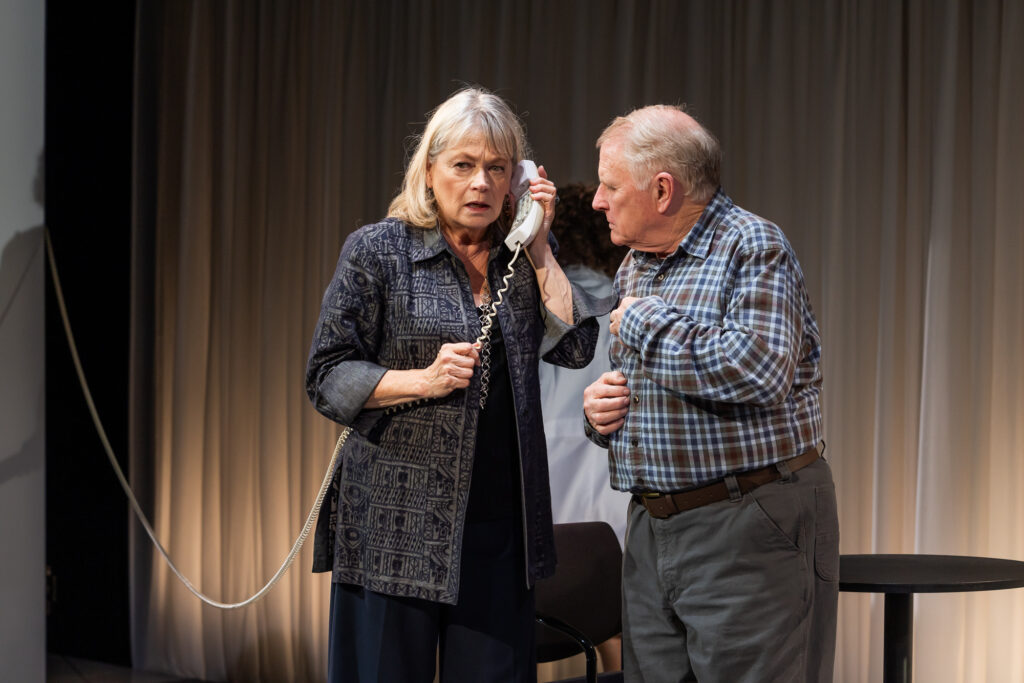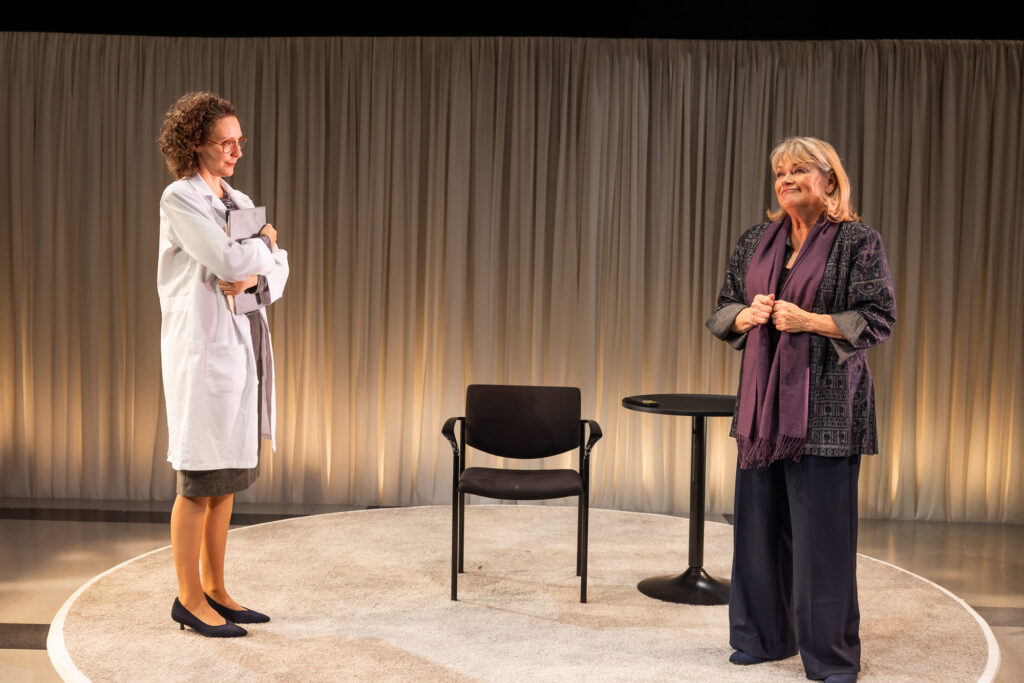
Karen MacDonald and Gordon Clapp; Photo by Nile Scott Studios.
Presented by SpeakEasy Stage Company
Written by Steven Drukman
Directed by Paul Daigneault
Intimacy Direction by Jesse Hinson
Featuring: Marianna Bassham, Gordon Clapp, De’Lon Grant, Karen MacDonald, Greg Maraio
Oct 18 – Nov 16, 2024
Boston Center for the Arts
527 Tremont St
Boston, MA 02116
Critique by Kitty Drexel
“The first thing I do in the morning is brush my teeth and sharpen my tongue.”
― Dorothy Parker
BOSTON — It’s another excellent production from SpeakEasy Stage and the last non-musical from director Paul Daigneault before he moves to different things. Pru Payne by Steven Drukman is at the Calderwood Pavilion through Nov. 16.
Pru Payne (New England grand dame, Karen MacDonald) is a New York theatre critic with strong opinions, a caustic wit and decades of education and experience who finds herself writing her memoirs when the play begins. She’s trying to write, but she’s experiencing memory lapses. Her son Thomas (De’Lon Grant) sets her up at a state-of-the-art research facility. There, Pru meets Gus Cudahy (Gordon Clapp), a salt-of-the-earth custodial engineer with a heart of gold.
Pru and Gus fall in love and find new life in a facility devoted to understanding life’s end. Along the way, Pru teaches Gus about high art and Gus teaches Pru about the comforts of mass entertainment. Greg Maraio plays Gus’s brusque son Art. Marianna Bassham plays the dignified, literal-minded Dr. Dolan. SpeakEasy’s website says, “With wit, verve, and above all, heart, Pulitzer Prize nominee Steven Drukman explores questions of memory, identity, and connection.”
MacDonald’s take on the role of Prudence Payne is Dorothy Paker-meets-Susan Sontag: confident, intelligent, outrageously out-spoken yet aware of her faults and limitations. Payne is acerbic in her most brilliant moments. In the throes of her illness, Payne is shattered and exposed. It’s heartbreaking to watch MacDonald confront Payne’s human frailty. And yet, it’s a wonder to behold such dramatic artistry.

Marianna Bassham and Karen MacDonald; Photo by Nile Scott Studios.
Memory disorders such as dementia will cause confusion, frustration and other changes in patients. Those same patients are still human beings capable of joy, humor and nostalgia. MacDonald plays Payne with respect and dignity as the character blips in and out of illness. Payne has highs and lows. MacDonald guides the character through them believably and lovingly.
Gordon Clapp also plays Gus with love. Gus is a wily man who can’t believe his luck. Clapp gives him depth, dignity and a backbone. From Clapp’s portrayal, we can see exactly why Prudence fell in love with Gus.
Clapp and Maraio’s accent work was swell. Their dialectical pronunciations of “horses” (hosses/husses) and “potato” (b’daydo) were nice touches. My New Hampshire aunts and uncles still talk this way. It took me back.
The scenic design by Christopher and Justin Swader, the Swader Set, is at once a research lab and a daytime talk show stage – spare, cold but hopeful. The lighting design by Aja M Jackson captures the essence of both settings while showing us the movement of the sun as time goose steps forward.

Greg Maraio and De’Lon Grant; Photo by Nile Scott Studious.
The character Pru Payne says she is not an artist but a critic several times during the play. It was a rule of thought amongst old-guard critics that journalists covering the arts should distance themselves from artistry to remain objective in their journalism. Objectivism is implausible. Objectivism in criticism – a genre of journalism dependent on a writer’s opinion – is especially impossible. There is an art to good journalism, after all, and engaging in the art one criticizes can only make a writer better educated and more empathetic. Life is short; make the art that brings you joy.
Playwright Steven Drukman writes the character Prudence Payne as a lofty woman with deep-seated convictions. It is perfectly acceptable for Prudence to believe she isn’t an artist (despite the play’s evidence to the contrary). She gets to identify however she wants. But, it is unacceptable for Prudence and other critics to say all critics aren’t artists because of an old-fashioned plea for impartiality. It’s not true, and the next generation of critics won’t stand for it. They are already changing the standards.
Everyone is a critic. Opinions are like rectums, etc. Then it stands, critics can be artists. Criticism can be art. All sorts of impossible things can be true. I mean, if a convicted felon is a legitimate candidate for the presidency, then a critic can be whatever they want. You might as well make the art.
Watching the great artistry of Pru Payne was a struggle and also a pleasure. I struggled because it hit several nerves. Dementia runs in my family. Several of my family members live with Alzheimer’s. There’s a possibility I may develop it as I age. I enjoyed it because SpeakEasy’s cast tells a great story well. Pru Payne shows its audience that life doesn’t end after diagnosis. For some, it is just beginning.
